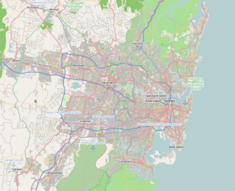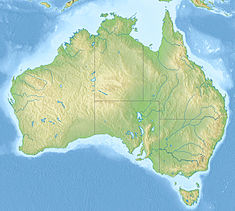The Glass House, Castlecrag
This article relies largely or entirely on a single source. (September 2020) |
| The Glass House | |
|---|---|
| Location | 80 The Bulwark, Castlecrag, City of Willoughby, New South Wales, Australia |
| Coordinates | 33°48′06″S 151°13′11″E / 33.8017°S 151.2196°E |
| Built | 1957 |
| Built for | Bill and Ruth Lucas |
| Architect | Bill Lucas |
| Official name | The Glass House; Glasshouse; Bill Lucas House |
| Type | State heritage (built) |
| Designated | 21 October 2016 |
| Reference no. | 1981 |
| Type | House |
| Category | Residential buildings (private) |
The Glass House is a heritage-listed domestic dwelling at 80 The Bulwark, Castlecrag, Sydney, New South Wales, Australia.[1] It was designed by Ruth and Bill Lucas.[2] It is also known as the Glasshouse or the Lucas House. It was added to the New South Wales State Heritage Register on 21 October 2016.[3][full citation needed]
History
[edit]Construction
[edit]The Glass House is part of Walter Burley Griffin and Marion Mahony Griffin's 1920s subdivision. The couple had arrived in Australia in 1914, having won the competition for the design of the new national capital, Canberra. In 1920, Griffin formed the Greater Sydney Development Association Ltd. to build residential estates on three picturesque headlands in Sydney's Middle Harbour. Castlecrag was the first of these estates, begun in 1921. Griffin and Marion moved from Melbourne to Castlecrag in 1924, and Marion took the role of a community leader at Castlecrag. By 1937, only nineteen houses, sixteen of them designed by Griffin, had been built on the 340 lots. The Glass House was one of three adjoining houses designed by Lucas.[citation needed]
The Glass House was designed by Sydney architects Ruth and Bill Lucas as a home for him to share with his wife and their children and was also to be used as a studio for their architectural practice and completed in 1957.[4] Lucas' design projects included educational centres, an Aboriginal women's refuge, and furniture and theatre sets.[5] The family moved to Paddington in the early 1960s and joined the campaign to help save the area from slum clearance.[6] Bill Lucas worked to develop architectural processes and prototypes.[7] He was a member of the loose association of architects that is now known as the Sydney School.[8]
Recognitions
[edit]Docomomo International recognises the Glass House as a seminal example of the "shelter-in-nature" minimalist compositions constructed in northern Sydney post World War II. William J. R. Curtis, author of Modern Architecture since 1900, singles out the Glass House as a remarkable example of an Australian adaptation of modernist principles, being "so understated that it virtually disappeared into its wooded setting". The Glass House was also listed on the New South Wales State Heritage Register on 21 October 2016.[citation needed]
Description
[edit]The Glass House is a single-storey residence built over a steeply sloping bush site. One corner of the house barely touches the natural sandstone outcrops. The rest of the building and the decks are suspended over vegetation and rock outcrops. The rectangular plan is divided up into a grid of 1.1 square metres (12 square feet). A timber framework is braced with steel cross-bracing: four slender steel posts are the main structural elements, forming the corners of the lightwell. Entry is from a path beside the carport. Visitors enter straight into the first living room, which was used by Bill and Ruth Lucas for meetings with clients. A wall separates this area from the kitchen and a larger portion of the living/dining room. The living room and kitchen are glazed, opening onto the front deck and the internal deck and light well.
The original construction is described in an article in Architecture in Australia, October–December 1957. The house is suspended on four 7.6-centimetre (3.0 in) square columns. All the timbers are rough-sawn creosoted hardwood inside and out. Wall timbers are restricted to mullions and posts at 1.2 metres (3.9 feet) centres and the roof framing to purlins at 1.2 metres (3.9 feet) centres on beams at 3.7 metres (12 feet) centres. The roofing was originally constructed with deep corrugated asbestos cement, having no roof battens. Safety mesh was stretched over the purlins and supported a 57-gram (2 oz) white fibre-glass blanket between clear Visqueen and double-sided sisalation.[1]
Restoration
[edit]The floor is tiled with a slate that has cracked because of the movement of the structure. The house used to move considerably in the wind before 2003 due to missing cross-struts and beams that originally braced the house. In 2002–2003, a remedial works program replaced all the foundation fittings and re-braced the house. Bracing was increased in some areas from 1/2" steel rods to 3/4" steel rods. The floor comprises 3.7 by 1.2 metres (12.1 by 3.9 ft) Stramit panels, being masonite-faced on hardwood joists at 0.61-metre (2.0-foot) centres. Stramit is also used for the internal walls.
See also
[edit]References
[edit]- ^ a b "The Glass House". New South Wales State Heritage Register. Department of Planning & Environment. H01981. Retrieved 2 June 2018.
 Text is licensed by State of New South Wales (Department of Planning and Environment) under CC BY 4.0 licence.
Text is licensed by State of New South Wales (Department of Planning and Environment) under CC BY 4.0 licence.
- ^ Lonergan, Peter (17 August 2022). "Revisited: Glass House by Bill and Ruth Lucas". ArchitectureAU. Archived from the original on 17 August 2022. Retrieved 3 October 2024.
- ^ HMS - Start your search (nsw.gov.au) https://www.hms.heritage.nsw.gov.au/App/Item/SearchHeritageItems?_ga=2.165972984.714120821.1658117920-344545924.1656901875
- ^ "Lucas House - Docomomo Australia". docomomoaustralia.com.au. 30 June 1957. Retrieved 9 May 2024.
- ^ "Two Point Perspective: the Glass House". Museums of History NSW. 3 November 2021. Retrieved 9 May 2024.
- ^ "Bill Lucas :: biography at :: at Design and Art Australia Online". www.daao.org.au. Retrieved 9 May 2024.
- ^ Obituary – Bill Lucas | ArchitectureAU https://architectureau.com/articles/obituary-23/
- ^ "Bill Lucas: Architect Utopian". ArchDaily. 28 February 2022. Retrieved 9 May 2024.
Bibliography
[edit]- DoCoMoMo International working party for documentation and conservation of buildings, sites and neighbourhoods of the modern movement (2003). Members Update 2003.
- Taylor, Jennifer (1984). An Australian Identity: Houses for Sydney 1953-1963.
- Gruzman, Neville (1 November 2001). "Bright thinker pursued his utopian vision". Sydney Morning Herald.
- Myers, Peter (2002). 'Bill Lucas 1924-2001' in Architecture Australia, November-December 2002.
- Curtis, W. J. R. (1982). Modern Architecture Since 1900.
Attribution
[edit]![]() This Wikipedia article was originally based on The Glass House, entry number 01981 in the New South Wales State Heritage Register published by the State of New South Wales (Department of Planning and Environment) 2018 under CC-BY 4.0 licence, accessed on {{{accessdate}}}.
This Wikipedia article was originally based on The Glass House, entry number 01981 in the New South Wales State Heritage Register published by the State of New South Wales (Department of Planning and Environment) 2018 under CC-BY 4.0 licence, accessed on {{{accessdate}}}.


